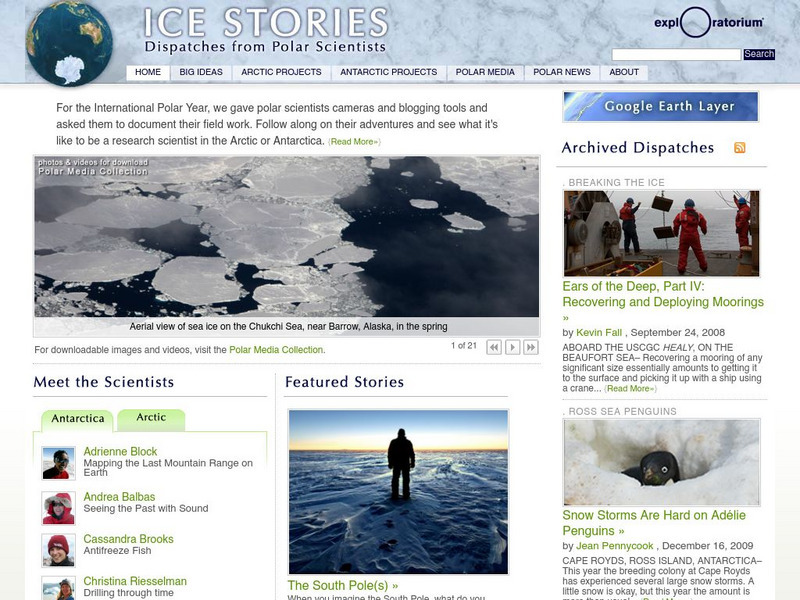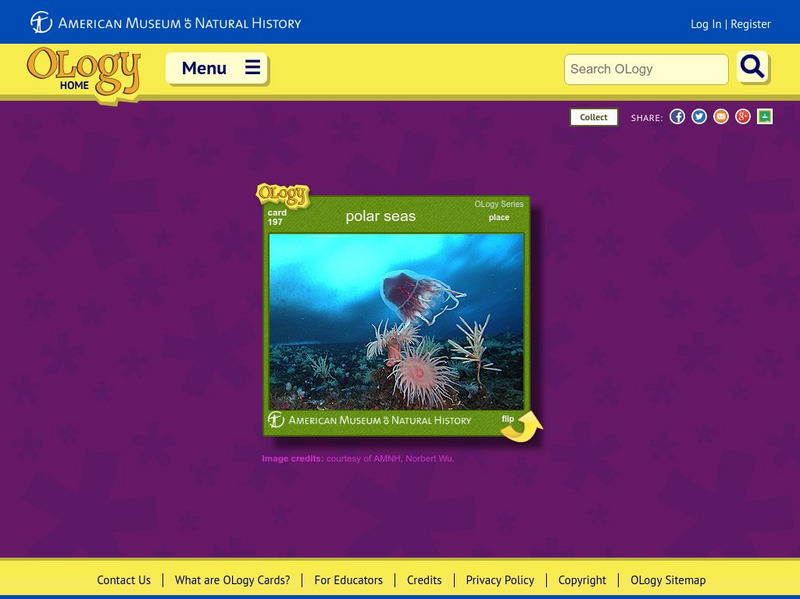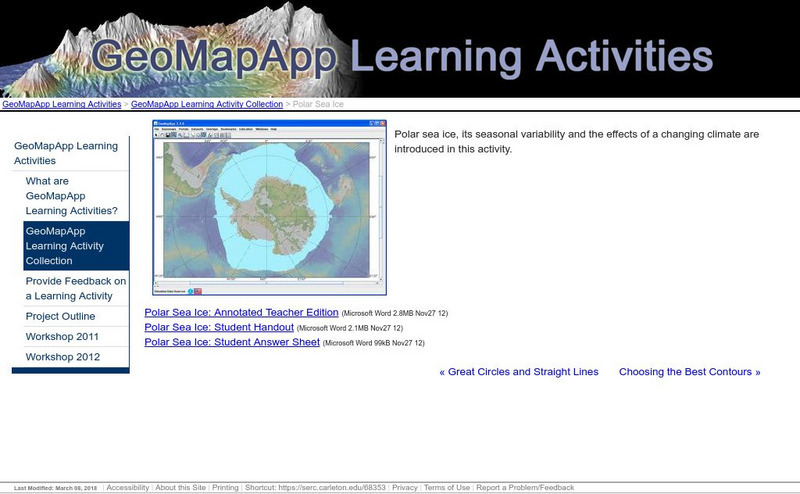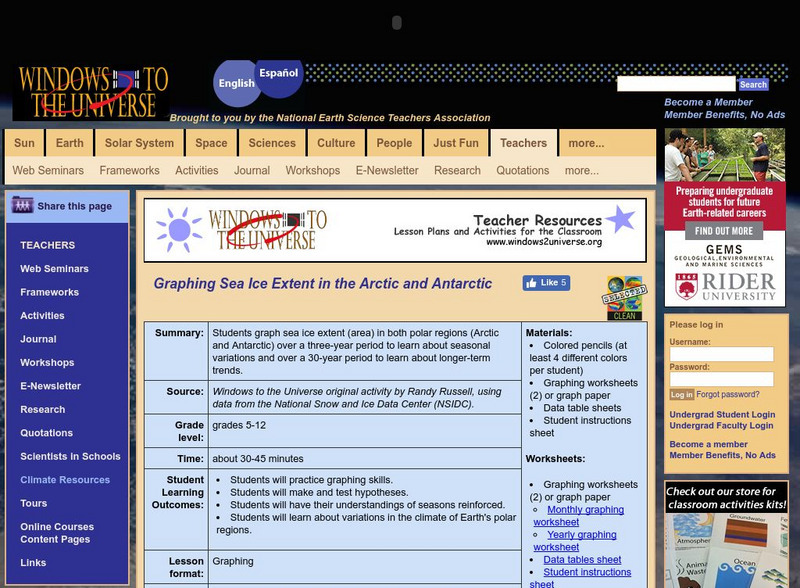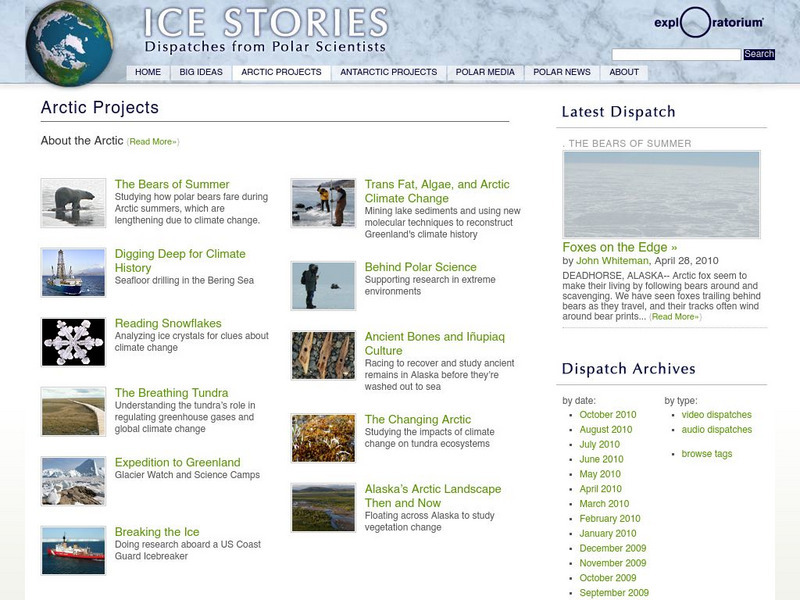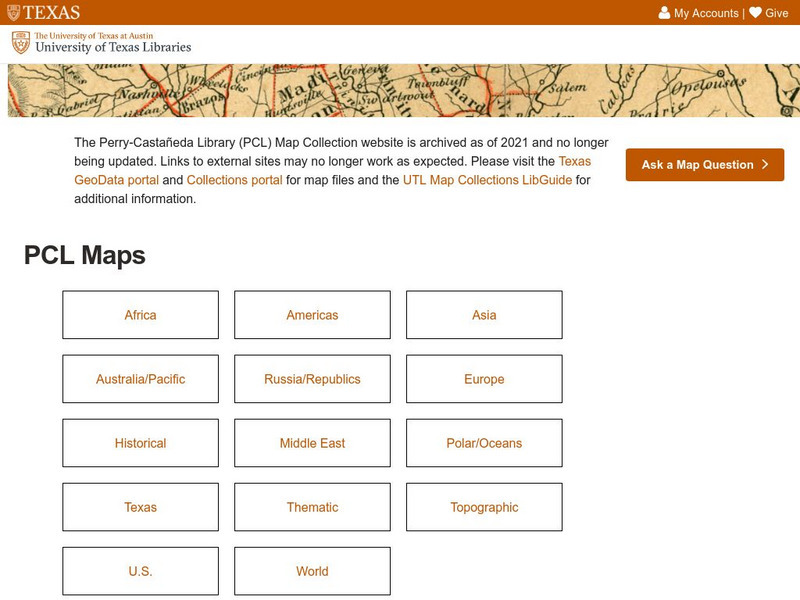World Wildlife Fund for Nature
Wwf: Our Earth: Ecoregions: Habitats: Polar Regions
A simple introduction and overview of the polar regions. Includes a link to information about animals that live in a polar habitat.
University of Texas at Austin
Ut Library Online: Historical Maps of the Polar Regions
This collection from the University of Texas Library Online of historical maps contains a variety of maps from various parts of the polar region and from different parts of history. Each map is accompanied by a brief description and is...
National Earth Science Teachers Association
Windows to the Universe: Warming of the Polar Regions
Learn about the climate in the Polar regions and how it is affected by global warming. Links to related material.
Other
Polar Continental Shelf Project for Kids!
Visit this resource to learn about the geography, wild life, plants and people of Polar Continental Shelf in Canada's Arctic. Students can take a quiz to see how much they have learned.
Exploratorium
Exploratorium: Ice Stories: Dispatches From Polar Scientists
During the International Polar Year, scientists descended on the Arctic and the Antarctic in droves. While there, they documented their experiences and research work. That rich database of information, covering November 2007 to October...
American Museum of Natural History
American Museum of Natural History: Polar Seas O Logy Card
Flip over this interactive OLogy card and start learning bite-size pieces of useful information about the marine life that lives in polar-sea regions.
Ohio State University
Beyond Penguins and Polar Bears
This online magazine for educators is geared to integrate inquiry-based science and literacy focused in the concentrated area of the arctic and antarctic.
Ohio State University
Beyond Penguins and Polar Bears
This online magazine for educators is geared to integrate inquiry-based science and literacy focused in the concentrated area of the arctic and antarctic.
Science Education Resource Center at Carleton College
Serc: Polar Sea Ice
Polar sea ice, its seasonal variability, and the impact of a changing climate are investigated in this activity. Students will also explore the differences between polar regions that result from Antarctica being a continent and the north...
Concord Consortium
The Concord Consortium: Can a Substance Dissolve in Both a Nonpolar and a Polar Liquid?
In this learning module from The Concord Consortium, students will investigate how polar and non-polar regions in big molecules interact to result in certain shapes and properties for those molecules.
Other
Scott Polar Research Institute: Polar Bears
Here you can learn about polar bears: where they live, what they eat, and what each part of their body is adapted for.
National Science Foundation
National Science Foundation: Arctic & Antarctic
The National Science Foundation has conducted extensive research on this region that is often thought of as barren and devoid of all scientific promise. Learn more about these frigid regions and what is being done to understand more...
University of Guelph
Canada's Polar Environments
This site is a set of images along with volumes of information make this site a treasure trove. The site has satellite images.
Concord Consortium
Concord Consortium: Polar and Nonpolar Interface
Observe how molecules with hydrophilic and hydrophobic regions move in a mixture of oil and water, and pay attention to changes in potential energy over time. Move and rotate the molecules to see how they interact with their surrounding...
Science Education Resource Center at Carleton College
Serc: Sea Ice Extension for the Earth as a System Learning Activity
The purpose of this lesson is for students to learn how the Earth's systems interact on a global level. They will examine global environmental data and compare this to data on the polar regions. In the process, they will develop an...
Climate Literacy
Clean: A Global Issue: The Impacts of Climate Change
This is lesson five of a 9-lesson module. Activity explores the effects of climate change on different parts of the Earth system and on human well-being: polar regions, coral reefs, disease vectors, extreme weather, and biodiversity.
Smithsonian Institution
National Museum of Natural History: The Hall of Arctic People
This is the online version of the Smithsonian Institute's exhibit devoted to the people of the Siberian and North American Arctic. The mannequins around the walls represent the peoples of the Crossroads region, dressed in traditional...
National Earth Science Teachers Association
Windows to the Universe: Graphing the Extent of Sea Ice in Arctic and Antarctic
Students graph sea ice extent in both polar regions over a three-year period to learn about seasonal variations, and over a 30-year period to learn about longer-term trends.
University of Waterloo (Canada)
University of Waterloo: Archaeology in Arctic North America
A resource regarding the Arctic region and a look at some of the recent archaeological projects there. The introduction offers a short look at the geography and history of the area.
University of California
Polar Bear Capital of the World
Churchill, Canada is known for its polar bear population before the bay freezes. Find out all about this incredible visitation every year. Read polar bear facts, lore, rules of bear safety, and wildlife management applied to polar bears.
NOAA
Noaa: Southern Region Weather: Global Circulations
"Global Circulations explain how air and storm systems travel over the Earth's surface. The global circulation would be simple (and the weather boring) if the Earth did not rotate, the rotation was not tilted relative to the sun, and had...
Exploratorium
Exploratorium: Ice Stories: Arctic Projects
Scientific research projects being done in the Arctic are showcased here. Projects cover a variety of topics, e.g., polar bears, the impact of climate change and glaciers. There are numerous links to articles, as well as video and audio...
University of Texas at Austin
The Perry Castaneda Library Map Collection
This collection contains more than 250,000 maps covering all areas of the world, and ranging from political and shaded relief maps to the detailed and the historical. Select from a region of the world or an area of highlighted interest.
Woods Hole Oceanographic Institution
Woods Hole Oceanography Institute: Comparing the Poles
Have you ever wondered how the Arctic differs from the Antarctic? This resources contrasts the physical features, organisms and human impact of these two regions.
Other popular searches
- North Polar Regions
- Arctic Polar Region
- Polar Regions Thematic Unit
- Polar Regions Games
- Polar Regions Grade K 2
- Polar Regions Art Work
- Polar Region Food Chain
- Global Warming Polar Regions
- Polar Regions Lesson Plans
- Graphing the Polar Regions
- Polar Regions 3 D Projects
- Polar Region Math



